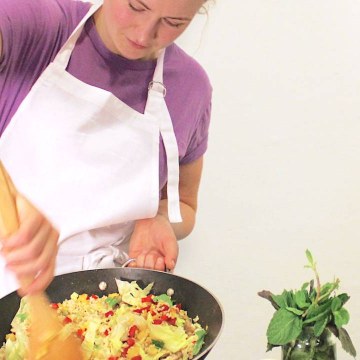
Blogs

Stir-frying is a method of cooking where ingredients are fried in a small amount of very hot oil while being stirred. This technique originated in China but has spread into other parts of Asia and the West. To traditionally stir-fry, the most obvious tool you need is a good wok and spatula. However, if you don’t have a wok, that shouldn’t stop you! Simply use a large, wide frying pan with some other basic pantry ingredients. You’ll soon be able to whip up the most delicious stir-fry recipes.

Many vegetables are ideal for steaming, as is fish, duck, chicken and many types of shellfish. The steaming process locks in and enhances the vibrant colours of vegetables.

Fermented foods are rich in probiotic bacteria. Consuming fermented foods adds beneficial bacteria and enzymes to your overall intestinal flora, improving the health of your gut microbiome and digestive system and boosting the immune system. Some experts say that every small 1/2 cup serving of fermented food can contain up to 10 trillion probiotic organisms. Not only are fermented foods good for you, but they also add a new depth of flavour and umami to (often bland) vegetables. They can be tangy, savoury, salty and delicious! Sauerkraut, kimchi, yoghurt, wine, chocolate and cheese are all classic examples of fermented ingredients that pack a punch.

Fermenting is a simple, tasty way to preserve food with added health benefits. Chances are you’ve been eating fermented foods your whole life, maybe without even realising it! So many of the everyday staples we take for granted (like wine, tea, bread and chocolate) are made using different fermentation processes.

Korean Chilli Paste (Gochujang)
Gochujang is probably one of the most famous Korean condiments. This fermented red pepper paste is used in an array of dishes and adds colour and a huge flavour kick! It’s made from fine Korean chilli powder, glutinous rice, fermented soybeans and salt. While it’s known for being spicy, it also has subtle sweet notes. Keep in the fridge after opening and use within 3 months. The top of the paste may become darker or dry out, but it’s still edible.

Seasonal and slow cooked. There’s no denying the magic that South Korean monks bring to their food. A cuisine made from more than just culinary skills, but from the heart and soul. Traditionally, food offered to religious entities before being offered to humans was considered ‘temple food’. In the Western world it is typically associated with the food of Buddhist monks. As Buddhism spread, the monks gradually made the switch from begging for alms to preparing their own meals, and thus was born the temple cuisine, ‘sachal eumsik’.
